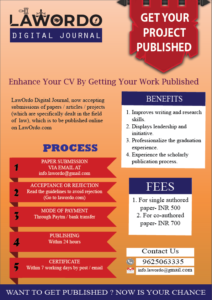Advocacy Ethics and Misconduct an Overview
AUTHORED BY: SANAH SETHI
AMITY LAW SCHOOL (L.L.B 3 YEARS)
ADVOCACY: ITS IMPORTANCE
Advocacy is a noble and honorable profession. Such recognition has been conferred on the legal profession by the society for so many centuries. It is considered as one of those careers, which is meant for the service of the community. In fact, there is no other career, which touches the various aspects of human life. This is the reason, why the lawyers are considered as the guardians and vindicators of the two most important things : Liberty and Justice, they can do so only when they maintain certain ethical and intellectual standards so that not only the high dignity of the profession will be maintained but also the better quality of service would be available to the public.
Legal practice is not a trade or business but a profession. It is an institution meant for public good. In other words, it is a ‘branch of administration of justice and not merely money making occupation’. Unfortunately the pious objects of this profession are lost and various evil practices are entering in this profession in modern days only to earn more and more money by any means. The result is that the greatness, nobility and the honour of this profession is degenerating fast. Such evil tendencies prevailing in legal profession need proper attention of the Government and requires suitable remedial measures to prevent the same.

ADVOCACY: NOT A TRADE OR BUSINESS
An advocate should not make his profession, a trade or business. In business, the sole object is to make money, while in legal profession, the sole object is public service and to discharge social obligation. In England, wealthy people take up legal profession with an ideal of public service, than as a means of earning livelihood. In other words, the primary purpose of legal profession is public service and gaining livelihood is secondary or incidental. An advocate should not employ agents or brokers for securing briefs.
Advertising- Advertisement or publicity is a process by which attention of public is drawn. Advertisement directly or indirectly in legal profession is strictly prohibited. Advertising by advocate to improve his practice, amounts to ‘professional misconduct’. In re A, an Advocate (AIR 1962 SC 1337)- The Supreme Court held that, writing letters stating his achievements and specialized knowledge for getting brief, amounts to misconduct.
As per Rule 47 of Chapter II of Part IV of the Bar Council of India Rules, an advocate shall not personally engage in any business; but he may be a sleeping partner in a firm doing business provided that in the opinion of the State Bar Council, the nature of the business is not inconsistent with the dignity of the profession.
ELEMENTS OF ADVOCACY
The following are the elements of advocacy:
Filing the case- The plaintiff presents his case along with cause of action through the plaint. The plaint is also called the written statement.
Pleading- The fundamental principles of pleadings are :
Every pleading must state fact and no law;
It must state all the material facts;
It must state facts concisely but with precision and certainty.
Arguments- The names of witnesses and the documents in support of the issue should be clearly noted. An advocate should study the record of the case with the object of discovering the weak points and also the strong points in the opponent’s case.
LAMPS OF ADVOCACY
Honesty- Example for honest character is Abraham Lincoln, who founded his fame and success on what some called ‘perverse honesty’. He should disclose the real facts and legal position to his clients frankly. These three virtues together are essential for the success of an advocate.
Courage- An advocate should face the pressures from outside with courage. Sometimes he has to fight against State. Advocacy is a form of combat where courage in the face of danger means winning half the battle.
Industry- Advocacy is indeed a life of industry and a lawyer must study his brief in the same way that an actor studies his part. Advocacy is an intellectual profession. Intelligence and knowledge will be sharpened with hardwork and strenuous efforts. Advocacy is the profession, which require study throughout the career. Law changes day to day. To acquire upto date knowledge an advocate must refer international and national journals, reference books of his library and the bar library.
Eloquence- Eloquence means fluent speaking and skilful use of language to persuade or to appeal to the feeling of others. Fluent speaking impresses the listener. An advocate must be fluent, skilful in using appropriate words to impress the Court. Eloquence attracts the attention of the listener. Eloquence is related to the art of oratory.
Fellowship- Fellowship is exactly like a great public school, the boys of which have grown older and have exchanged boyish for manly objects. Though the advocates are opponent parties before the bench but not enemies with each other their conflict ends as they come out of the doorsteps of the Court. There is no discrimination of age, ability, experience and riches between the advocates. All are equal.
PROFESSIONAL MISCONDUCT
In law, professional misconduct means an act done willfully with a wrong intention by the people engaged in the profession. If an act creates dispute to his profession and makes him unworthy of being in the profession, it amounts to ‘professional misconduct’. In other words, ‘An act which disqualifies an advocate to continue in legal profession.’
In State of Punjab v. Ram Singh, AIR 1992 SC 2188, the Supreme Court held that the term ‘misconduct’ may involve moral turpitude, it must be improper or wrong behavior, unlawful behavior, willful in character, a forbidden act, a transgression of established and definite rule of action or code of conduct, but not mere error of judgment, carelessness or negligence in performance of duty.
INSTANCES OF MISCONDUCT
The Legal Practitioners Act, 1879 has not defined the word ‘misconduct’. According to Section 13 of the Act, following are the instances of misconduct/unprofessional conduct.
Taking instructions in any case from a person who is not the party or his authorized agent.
Fraudulent or improper conduct in discharge of professional duty.
Any other reasonable cause.
Misconduct of an advocate may be explained with reference to the following heads.
Misappropriation- When an advocate collects money from his client for court purposes and misuses, it is called misappropriation, which amounts to professional misconduct. Similarly, if the advocate misappropriates his client’s funds or property to favour his near or dear, it amounts to misconduct.
S. Raghbir Singh v. The Crown:
In the instant case, the advocate cheated his client and received money. He also forged a power of attorney and got a false decree passed against his client in favour of his own brother. It was held that he was absolutely unfit for the legal profession.
Changing sides- An advocate is under a duty to do his best to protect the interest of his client. He must not represent both the parties. If so, it amounts to misconduct.
Giving improper advice- An advocate must give his client the benefit of his learning, talent and judgment. An advocate should give proper advise, since the fate of his client rests on him. If he is unable to take up the brief, he should advice the client to consult another counsel, but should not give improper advice. Improper advice amounts to misconduct.
Non-speaking of truth- There can be no justification at all for not speaking the truth. The fact that a man is going to be injured professionally if he does speak the truth is no valid excuse for telling a lie, but, it is an attitude which is not uncommon and which is not of the most serious character.
PUNISHMENT FOR MISCONDUCT AND PROCEDURE
Before passing of the Advocates Act, 1961, the power to punish the advocates for misconduct was vested with the High Courts. Chapter V of the Advocates Act, 1961 deals with conduct of advocates. Section 35 of the Act provides for the rules as to punishment of advocates for misconduct which are as follows:
On receipt of a complaint against an advocate for alleged guilt of misconduct, the State Bar Council, if it has reason to believe, refers the matter to its disciplinary committee.
The Disciplinary Committee of the State Bar Council shall fix a date for hearing of the case. Notice must be given to the advocate concerned and the Advocate General of the State.
The Disciplinary Committee, after hearing the case, may make any of the following orders:
Dismiss the complaint.
Re-permit the advocate.
APPEAL TO THE BAR COUNCIL OF INDIA
Provision is made under Sec. 35 of the Advocates Act, 1961 to make an appeal within 60 days from the date of order by State Bar Council, to the Bar Council of India.
DISQUALIFICATION AND REMOVAL FROM ROLLS
Moral turpitude is a very serious disqualification. As per section 24-A of the Advocates Act, a person cannot be admitted as an advocate on a State Roll if he is convicted of an offence involving moral turpitude.
If an advocate is involved in the offence under the provisions of the Untouchability Act, 1955 the Disciplinary Committee can order for removal of his name from the rolls of advocates as no person shall be admitted as an advocate on a State Roll if he is convicted of an offence under the provisions of the Untouchability Act, 1955 as per section 24.A(1)(b) of the Advocates Act, 1961.
For the offence of misappropriation, the Bar Council must strike off his name from the rolls.
If an advocate is convicted under Section 307 of Indian Penal Code, 1860 for the assault on opponent in Court room with a knife he is entitle for the punishment of removal from the rolls of the Bar Council.
An Advocate whose name is struck off the State Rolls should not practice in any Court and the certificate granted to him under Section 22 of the Advocates Act, in respect of his enrolment shall be recalled.
AUTHORED BY: SANAH SETHI
AMITY LAW SCHOOL (L.L.B 3 YEARS)


